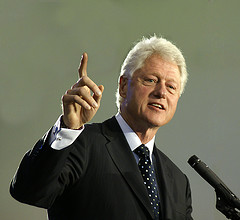The American Public Broadcasting Corporation’s (PBS) new installment of The American Experience: the Presidents is a biography of the 42nd President, William Jefferson Clinton, that feels more like a drama than history. Clinton paints a picture of a highly improbable president, born famously into impoverished circumstances in Hope, Arkansas, with a father who died before his birth and an alcoholic stepfather who beat his mother in front of the children. Consequently, Clinton threw all of his efforts into his studies, laboring to redeem and rescue his family, and substituting a broken home life for his ersatz, carefully managed public persona at school. Such a stratagem recurs throughout Clinton’s life: when situations become tough, Clinton pretends as though they are not happening.
Unfortunately for Oxford students, Clinton contains barely a scant mention of his time as a Rhodes Scholar. Indeed, although Clinton’s political ambitions were clear to many who knew him, the documentary neglects Clinton’s higher education and its incubation of his political desires to focus on his more formative high school years. In fact, Clinton was so outstanding in high school that the school’s principal barred him from running for class president, to preserve some accolades for other students. The only mention Clinton’s other institutions — Georgetown University and Yale Law School — receive is in connection with his eventual wife, Hillary Rodham, a young feminist whom he met during “a rare visit to the law library”.
After giving up a promising opportunity with a Washington, D.C. law firm, Hillary Clinton moved to Arkansas where Bill first ran — unsuccessfully — for US Congress at the tender age of 28. Hereafter, the Clintons’ marriage, perhaps unsurprisingly, features prominently in the documentary. Clinton employs the oft-used-but-rarely-fruitful technique of utilizing ex-aides and childhood friends, turned amateur psychologists, to analyze the Clintons’ relationship. A panoply of high-profile characters including James Carville, Dee Dee Myers, and John Podesta attempt to offer insight into the Clintons’ mysterious relationship. In the end, however, the Clintons’ marital life remains recondite. The documentary’s interviewees only offer the viewer platitudinous explanations, such as “there is a strange affinity about them”; “they are mystified with one another”, “they really love each other”; “somehow, they just make it work”, or Walter Lippmann’s famous quip, “Love endures when two people love not just each other, but mutual things”.

An insight into the mysterious dynamics of the Clintons’ marriage occurs after Bill loses the race for US Congress to the Republican incumbent, John Paul Hammerschmidt. Originally skeptical of this young parvenu, many Arkansas Democrats recognized Clinton’s charisma and work ethic. Clinton won the state’s governorship at the age of 32, but a utopian vision of government led to an unpopular tax increase on driving license renewals, and Clinton lost the governorship to a Republican just two years later. (At that time, Arkansas’s State Constitution established gubernatorial terms of 2 years; an amendment passed under Clinton later changed it to 4 years.) Determined to stave off the death of a political career that ended just as quickly as it began, Clinton plotted his comeback meticulously, tapping Hillary as the mastermind of his victorious campaign just two years later. Clinton became governor again at 34, and Hillary forever stepped into the spotlight as a political wonk in her own right, spearheading efforts on education reform (previously, Hillary’s feminist, Midwestern background, lack of accent, and thick-rimmed glasses did not sit well with Southern Democrats).
The documentary elides many of Clinton’s gubernatorial years, picking up again in 1988 when speculation began that Clinton might run for president. In some of the best five minutes of the documentary, Clinton’s campaign manager sits him down just one day before his expected announcement to recite the long list of women with whom Clinton had been “involved”. Clinton moves forward with the press conference, but stuns reporters by announcing that it is “too soon” for him to run for president. Later that year, Clinton gives a poorly-received and verbose speech in favor of Michael Dukakis at the Democratic National Convention. Yet again, Bill Clinton’s political career appears destined for the graveyard.
Four years later, Clinton announces his run for the presidency and shoots to the top of the polls in New Hampshire. His message of “entitlements in exchange for responsibility” caught fire and brought “Reagan Democrats” (looking for something different from the typical social model endorsed by liberals) into the fold.
Weeks before the primary, a young lounge singer named Gennifer Flowers appeared with recorded phone conversations. The possibility of Clinton’s characteristic stratagem — deny, deny, deny — was foreclosed quickly. Instead, Clinton campaigned for nearly 20 hours a day, adopting a mantra of “second chances”. In an interview, former White House Press Secretary, Dee Dee Myers, muses: “How many second chances does any one person deserve? Clinton’s view is as many second chances as a person is willing to try and take”. Clinton lost his lead in New Hampshire but managed to finish, respectably, in second place. Clinton dubbed himself “the Comeback Kid”, an apropos epithet for the remainder of his political career.
Clinton depicts a president lacking a majority (only 43% of the vote) and thus a mandate for governing in a particular way. His time in office was a matter of learning on the job with an inexperienced staff, an ill-managed first term in the White House and a family unprepared for the media scrutiny of the spotlight beyond small-town Arkansas. Mogadishu, Rwanda, Don’t Ask Don’t Tell (DADT), the Whitewater land scandal, a failed stimulus bill, a failed healthcare reform act all led to the Republican congressional gains in 1994 that made Clinton himself the issue of the midterm elections. Again, Bill Clinton’s presidency appeared finished just as quickly as it started.
 Clinton, who lacked confidence as Commander-in-Chief after “Black Hawk Down” and the failure to intervene in Rwanda, became a slave to public polling and his chief pollster, Dick Morris, after the momentous midterm defeat of 1994. Clinton even vacationed in Wyoming rather than the traditional presidential spot of Martha’s Vineyard, in order to avoid the elitist stigmatization of the New England hamlet. Yet, it was this same reliance on public polling that afforded Clinton the opportunity to blaze a new path, the so-called “Third Way” of moderate pragmatism. Clinton won the budget showdown against House Speaker Newt Gingrich by agreeing to balance the federal budget, albeit without Medicare spending cuts.
Clinton, who lacked confidence as Commander-in-Chief after “Black Hawk Down” and the failure to intervene in Rwanda, became a slave to public polling and his chief pollster, Dick Morris, after the momentous midterm defeat of 1994. Clinton even vacationed in Wyoming rather than the traditional presidential spot of Martha’s Vineyard, in order to avoid the elitist stigmatization of the New England hamlet. Yet, it was this same reliance on public polling that afforded Clinton the opportunity to blaze a new path, the so-called “Third Way” of moderate pragmatism. Clinton won the budget showdown against House Speaker Newt Gingrich by agreeing to balance the federal budget, albeit without Medicare spending cuts.
Predictably, the documentary devotes 45 minutes of the second installment to the Lewinsky scandal that dominated the second term of Clinton’s presidency. The film does so with considerable deft, interviewing reporters like Michael Isikoff and independent prosecutor Kenneth Starr. It cobbles together fascinating footage of Clinton testifying under oath, declaring judiciously, “There is no relationship”, leaving many to speculate whether there was one. Viewers see Hillary on national television excoriating the “vast right-wing conspiracy” against her husband. (Clinton later told her privately that he lied.) Such footage may satiate viewers who enjoy the mysterious dynamics of the Clinton marriage— admittedly, nearly all of us — especially the tidbits about Hillary’s calculated plotting for a New York Senate seat with political advisers, which took place in the Oval Office literally the day of the US Senate’s impeachment vote against her husband (the vote ultimately failed). Yet, for those interested in the policy decisions of the Clinton presidency, this focus on the Lewinsky Scandal comes at a cost. Clinton neglects key foreign policy decisions and the domestic policy relationship between Clinton and Newt Gingrich. Somalia, Rwanda, the Balkans, the Dayton Accords, the East Africa bombings, the emergence of al-Qaeda as a transnational threat, and the secret plan with Gingrich to reform Social Security—all receive only scant mention in this documentary.
In sum, Clinton leaves viewers with the image of a man growing into the presidency, who loved being president until the very last day of office (he literally remained in the Oval Office on Inauguration Day until George W. Bush’s aides kicked him out). Clinton depicts a president who recovered like none other, gaining (and subsequently losing) the trust of the American people innumerable times. A tragic figure, he leaves voters with the curious sense of unfulfilled promise. Perhaps no other American president in modern history has had so many second chances and political accomplishments, and yet left an impression of his time in office as wasted on some levels. Clinton does a commendable job of unpacking this mystery.
Ryan Berg is an MPhil student in political theory at Oxford.








No Comment